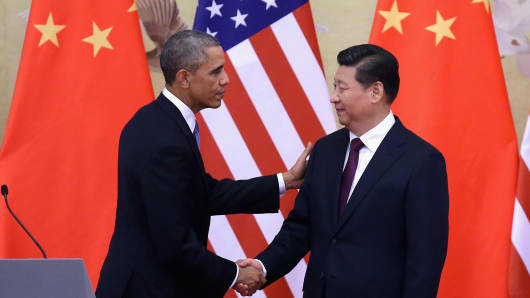International businesses of all sizes have grown increasingly dependent on the Chinese market, and the downturn in the Asia-Pacific region has had a vast ripple effect, including in the United States. These concerns add real urgency to this month's meeting between President Obama and Chinese President Xi Jinping in Washington, D.C. Now more than ever, it is time to take a firm stand against the egregious behavior of the Chinese government toward American companies.
The bilateral relationship between our two countries is one of the most important in the world. We are the two largest economies in the world; we are two of the largest countries by population in the world. It is certainly in the interests of both the American and Chinese people to strengthen the ties between our two nations, particularly in our interdependent world.
In 2012, $579 billion in goods and services were traded between the United States and China – from my home state of Missouri alone, more than $1.8 billion in exports went to Chinese customers in 2013. In the years I served in the U.S. Senate, China's economy boomed, and with it, two-way trade and investment between our countries also boomed, benefiting consumers and businesses in both our countries and increasing cultural understanding between our peoples. With the growth, however, came new issues and obstacles.
The past year, especially, has seen a significant rise in new barriers to foreign-owned company operations in China. Most are well known – fines, an opaque regulatory system and intellectual property theft all keep American and other Western companies from competing in China on an even playing field. These tactics are being used increasingly aggressively against American companies. Back in February, the chipmaker Qualcomm agreed to pay China a fine of nearly $1 billion for alleged violations of China's antitrust law and also conceded to lower its royalty rates for patents used in the market. Last month, Chinese authorities summoned American tech companies to let them know a new set of cyber-security regulations were being revived, even after widespread criticism that the rules were designed to be a thinly veiled backdoor into U.S. products, one through which the companies will be forced to hand over sensitive information like encryption keys.
Read More China ripple effect will hurt these currencies
Yet another flagrant case is that of the meat-processing company OSI Group, which was targeted by local Chinese authorities in a takedown last year that relied on a news exposé from a state-owned television station. More than 12 months later, six employees of the company's local subsidiary remain in jail without being charged.
Last year, a record $119.6 billion in foreign direct investment (FDI) entered China – access to its more than 1.35 billion consumers has proved too tempting for international businesses. But in recent months foreign companies have gotten more cautious about investing in China. In the first two months of 2015, U.S. investment fell more than 31 percent from the year before, due largely to increasing uncertainty about the safety of investments from foreign companies that are routinely targeted by Chinese regulators, competitors and state-owned media outlets.
Read More Why this market is oversold: Insana
Members of Congress can and should speak loudly and raise these worrisome issues with the Commerce Department and the White House, but it falls on the Obama administration to make the case directly to Chinese leaders. The message to President Jinping has to be clear: It's time for the shakedowns to stop.
Read MoreCan a Chinese tech giant speed up US networks?
Commentary by Kit Bond, a former four-term United States senator (R-Mo.), who was vice chair of the senate intelligence committee during his tenure, and a former two-term governor of Missouri. He led delegations to China during his time in public office and in the private sector, including serving as the vice chairman of the U.S.-China Interparliamentary Committee. Follow him on Twitter @KitBondMO.


